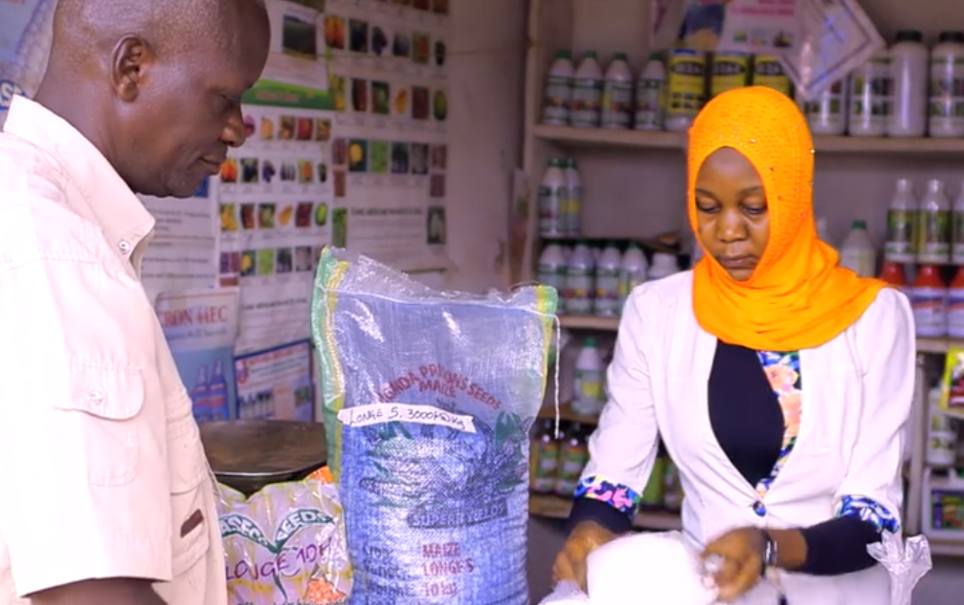In developing countries, haggling over prices of goods and services is common practice. A range of personal, economic, social and cultural factors influence strategies used during the bargaining process—and ultimately its outcome. For example, bargaining between a government official who pulls up in an expensive SUV and a poor woman selling tomatoes in a roadside stall is likely to be very different from that of two traders of equal standing cutting a deal involving a few tons of maize.
In a recent study conducted in rural Uganda, we built on prior research that hinted at biased perceptions against female-managed agro-input shops, examining the intricate dynamics that govern bargaining over a bag of maize seed of an improved variety. Employing a lab-in-the-field experiment, we focused on unraveling the complexities of negotiations between sellers and buyers, and in particular on how the gender of the seller shapes the bargaining process and outcomes—finding that women face a distinct negotiating disadvantage.
A bilateral bargaining experiment through a gender lens
In the experiment, a representative group of (both male and female) maize farmers was offered the opportunity to buy a bag of hybrid maize seed. A trained enumerator, guided by a script implemented on a tablet computer, acted as a seller. After explaining the virtues of hybrid maize seed to the buyer, the seller asked if the buyer wanted to buy the seed at an initial offer price. If the buyer rejected the offer, he or she was encouraged to make a first counter bid.
The seller’s actions were guided by an algorithm on the tablet, which determined whether to accept the counter bid (if the difference between the two bids was small enough) or if not, to begin a second round of negotiations, with a second offer price lower than the first but higher than the farmer’s initial counter bid. This process continued until the farmer accepted an offer price, or the seller was instructed to accept when the difference between last bid and new offer fell below a set threshold.
To estimate the causal impact of the seller’s gender on the bargaining process and outcomes, we randomly assigned 760 maize farmers to either a male of a female seller. We found that a discernible gender effect emerged as negotiations unfolded. Buyers facing female sellers were less likely to accept initial offer prices. Counter bids were significantly lower in the group of farmers paired with female sellers than among those negotiating with a man. Negotiations also extended over more rounds.
Most importantly, the final price that emerged after bargaining was almost 9% lower for female vs. male sellers. The probability density plot (Figure 1) shows a clear peak in the distribution of outcomes around 5,000 Ugandan shillings for transactions involving a female seller. If the seller is a man, meanwhile, the probabilities that farmers buy at 10,000 or 5,000 are almost the same. These findings suggest that biases manifest early in the negotiation process, shaping subsequent interactions.
Figure 1
Source: Van Campenhout and Nabwire, 2023
Significance
If gender proves to be an important determinant of bargaining dynamics and outcomes more generally, our study has important implications for efforts to improve women’s empowerment. Indeed, in many patriarchal societies characterized by strong gender norms and customs, operating small informal businesses is one of the few ways in which women can earn money independently from their husbands. In Uganda, we found that a surprisingly large share (over 40%) of agro-input shops are managed by women. Such “outside options” in the from of assets or income that women control have been shown to be key to women’s empowerment and household well-being—thus, addressing this bias is likely to have a range of positive effects.
Our study is limited in the sense that it merely shows the existence of gender bias in bargaining in a particular context and for a particular commodity; it does not provide reasons why this bias exists (e.g., prejudice, stereotyping, or statistical discrimination). Furthermore, our study concerns buyer-side discrimination; however, it could also be that sellers discriminate based on the gender of the buyer. To study this, as part of the Rethinking Food Market Initiative, we are currently using a mystery shopper approach, where we randomize the gender of the buyer, and test if shoppers behave differently on a range of characteristics of products bought and services obtained (including price). More generally, additional research is needed on the roots of these gender biased, such that appropriate policies and strategies can be designed to level the bargaining playing field.
Bjorn Van Campenhout is a Research Fellow with IFPRI’s Innovation Policy and Scaling (IPS) Unit based in Leuven, Belgium; Leocardia Nabwire is an IPS Research Analyst based in Kampala, Uganda.This post is based on research that is not yet peer-reviewed.
This work was carried out under the CGIAR GENDER Impact Platform, Market Intelligence, and Seed Equal Initiatives. The authors are grateful for the support of CGIAR Trust Fund contributors.
Referenced Project Paper:
Van Campenhout, Bjorn; and Nabwire, Leocardia. 2023. A field experiment on bargaining for seed reveals discrimination against women agripreneurs. Seed Equal Policy Note December 2023. https://hdl.handle.net/10568/135962







